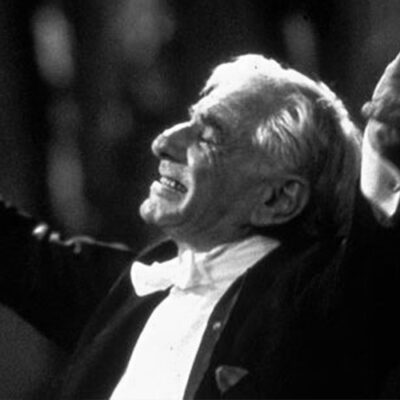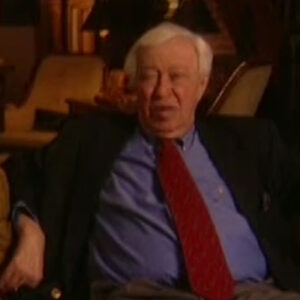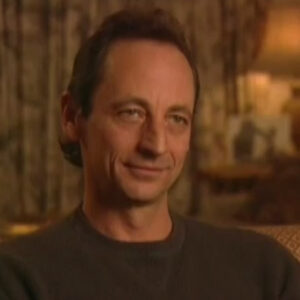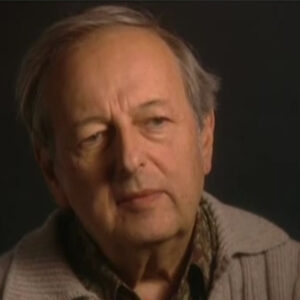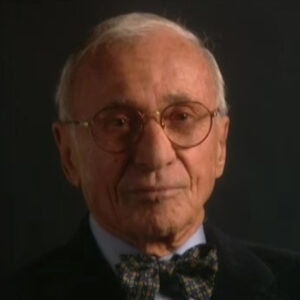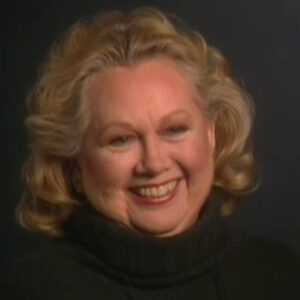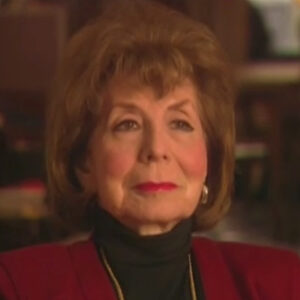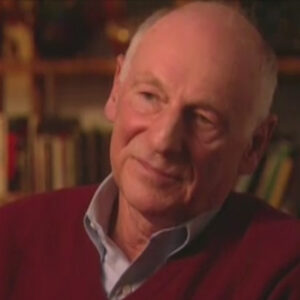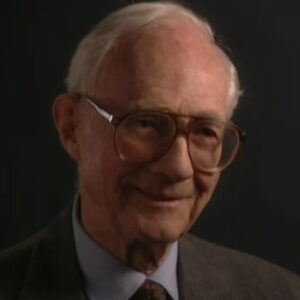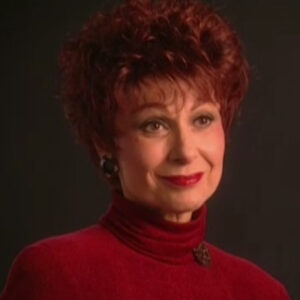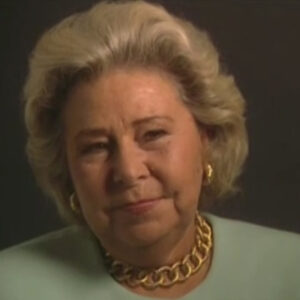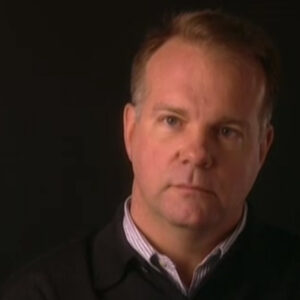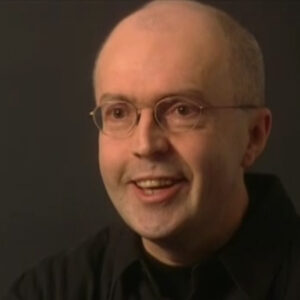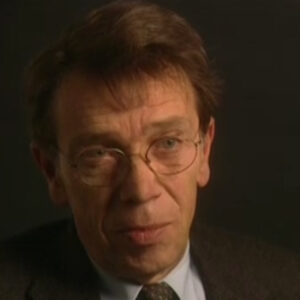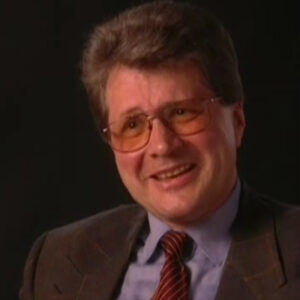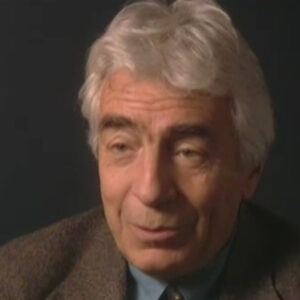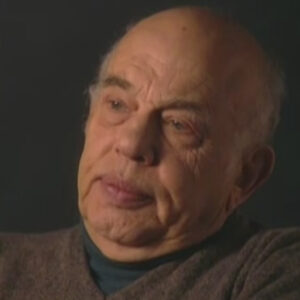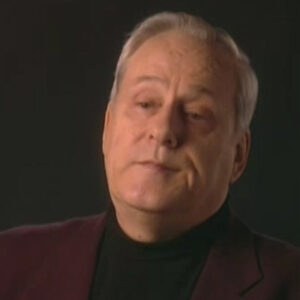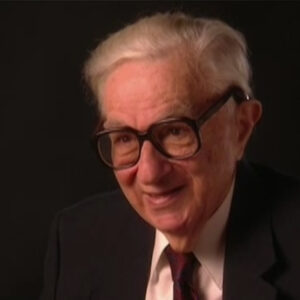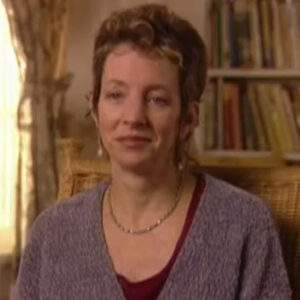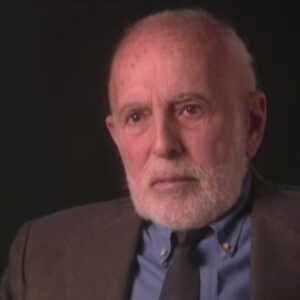Speaker It’s always easiest to get into this by just simply starting about what was your first contact with money?
Speaker Well, I.
Speaker I was hired, I came out of the Korean conflict, actually, I spent the Korean conflict in Germany, but nevertheless, that’s how I got drafted. I came out and George Abbott said, I have a job for you working on my sister Eileen. It’s a musical with Rosalind Russell. And we’ve just just arranged the composing lyric writing team. And it was Bernstein, Comden Green they had gotten rid of replace the original score. And and you want a job. You’ve got it. You can be the assistant stage manager. I’d worked for him before the war. So I remember Lenny coming up to Abbott’s office, which was in Rockville Centre. And I remember Russell, who was very glamorous, used to the movie star thing. She was the most Down-to-earth person in the world, but she where double the amount of mink coat that any one human being needed and drag it on the floor. And just she it was very seductive. And I think her her persuasion and Abbott’s because obviously they loved Abbott, Lenny, Betty. And they I think they felt they owed him a lot too. But it was very interesting to watch, watch them leave the office, committed to the to the project. And it required that they write the score in six weeks or something and they didn’t. It was a swell, perky, inventive score. What was your thought I was there as assistant stage manager who helped do casting, I read opposite a lot of actors and I and I got to know Lenny and Betty and Adolph and Joe Fields and Jerry showed up the way somebody who’s doing the auditions not well. But, you know, I was pretty awestruck, too. I had seen the original production of On the Town when I was in college at the University of Pennsylvania.
Speaker I came in, I was a theater obsessive and I saw the show and I saw it nine times in two weeks. I kept coming in on the train. I knew there was something new and fresh and and something that spoke to me about mostly the strange structure of it and the music and the the ballet music and what Jerry Robbins did with it and the idea that you could marry such a buoyant, sometimes downright foolish but joyful book with such serious music and such. Beautiful ballet. It was astonishing to me and an eye opener, you know, interestingly enough, I don’t think Wonderful Town went beyond that.
Speaker I think it’s sort of step back a little and was more old fashioned.
Speaker But it wasn’t an original concept for one.
Speaker No, not at all. Not at all.
Speaker But did you ever have a sense. I know I’m stretching here, but you do know that that Lenny and Adolf and Betty also lived in the village at a certain point in the 40s.
Speaker No, it’s it’s very this is probably not useful, but to you. But I my wife knew them all very well. And she’s 12 years younger than I, but she lived lived in California and they were all very close to her father, who was a composer. Comden Green wrote a show with him and Lenny worked with him in films. So she knew them all terribly well. And and when I met her, she still knew them better than I knew them. And she always had a kind of a super story.
Speaker She she was taken her family, Betty and Adolph and Lenny sent for her mother and and father to come to New York to see on the town and saw Chaplin and and Ethel.
Speaker And they came they came in New York as their guests and they put their little child in the theater as sort of better than than a babysitter. And she sat at the Adelphi performance after performance after performance, just besotted with the show, this little kid alone in a chair and every night because the war was on the show, opened with a star spangled banner, went back to California, and she heard The Star-Spangled Banner and said, That’s Lenny’s song very, very recently.
Speaker And it’s also happened recently.
Speaker Yeah, he died two weeks ago. Yeah, we were out there.
Speaker It was it was tough, but he had a hell of a life and he was 85.
Speaker We miss him a lot, but he did it so.
Speaker Oh, yeah, sure. Yeah. Oh it was.
Speaker Huh. But I thought I had I I’ve been so involved in all the plays like we could be at war and I wouldn’t know about it.
Speaker But you see, I didn’t know, I didn’t know the reviewers and and I didn’t know any of those. The kids, by the time I met them, they were they were probably still kids, but they were. Very established, I remember walking into Sardi’s and I was stage managing a show across the street at the Broadhurst that was my first job and assistant stage manager and I walked in and I’d go to the bar for a beer and the number one table would be the kids.
Speaker And I just sit there with my mouth agape, wondering if I’d ever know them.
Speaker Well, what happened after that? What happened to the wonderful town?
Speaker Well, after wonderful town, I really did get to know them, you know, not well again.
Speaker And and then a wonderful time was 53 by 50, wasn’t it?
Speaker 53 by 54. My partner and I were producing and that was the pajama game.
Speaker So I was kind of on the way to being established. I was also, by the way, parenthetically stage managing and producing the show, which I did with Damn Yankees the next year. Anyway, we had a very good record of my partner’s name was Bobby Griffith, and we had a really terrific record. We did four shows that that worked. And then I am told that we were offered West Side Story and turned it down. Arthur Laurents tells me that on any occasion possible, but I don’t remember that actually. But I’m sure it’s true. Those are the things people remember. However, we were doing a show based on Anna Christie, Bobby Knight, which Abbott was directing, and we were in Boston. The show was in trouble. And the the it had a wonderful score, but the book didn’t quite work. And there was a ballet in it that was giving us giving Bobby farseeing and Gwen Verden some trouble. And so it was a troubled time. And Steve Sondheim was a close friend of mine called and I didn’t even say, how are you? He was working on West Side Story for another producer. And I just unburden myself. And I said, oh, God, do we have problems? I was I was in Boston and I said, this is going wrong. And that’s going on. He listen to me and listen to me. Listen to me. And then it occurred to me after I, you know, ventilated totally over a period of an hour to say, and how are you? And he said it couldn’t be worse. And I said, what’s happened?
Speaker He said, We’ve lost our producer. And I said, oh, well. And I said, I don’t know what we’re going to do. And I didn’t take much of a pause. I said, well. We’d be interested and he said, you’re kidding, and I said, no, I said, but we got these problems. It was probably midweek. And I said, he said, you want to come in and talk about it or do you want us to come out? I said, no, no will come in on the on Sunday. But one I don’t want anybody to know we’re coming to. We’ll come right back Sunday night and three, if it does work out, please let us work on this show, which is a real problem, and get it into New York. And and let’s not talk about West Side Story until New Girl in town is open. He said great. He said, well, want to play the score for you? And I said, well, I know the score, Steve. You’ve playing it in my apartment for. A year or two, and he said, yeah, but Lenny doesn’t know you’ve heard the score and and he doesn’t want anyone to have heard the score, so you have to come in, Lainio, play the score, and you have to act as if you’ve never heard it before. So we came in and Lenny was living at the Ausborn and it was set up the piano, Lenny at the piano, Steve, Arthur, Jerry and Mr. Shermer, old Gus Schirmer, music publisher. And he sat in a chair, chair of honor, right.
Speaker Dead center, and nodded off almost immediately. And with Lenny playing a bit nervously, very noisily, that a lot of a lot of sound coming out of that piano, but didn’t disturb Mr. Sherman at all. And Bobby Griffith and I sitting there listening to the score for, quote, the first time. And it was just a great score and hearing Lenny play it about as thrilling as anything you can imagine. And I forgot that I hadn’t heard it before and started to hum along with it. And I could see the look on Steve’s face, but I didn’t understand what it was, you see. And I just went on and Lenny stopped at the end of a number and said, my God, what I’ve always wanted is a producer who understands music. This is miraculous. And I just grinning from ear to ear and we went right on that way. But I almost gave it away. But he he bought it and but I knew every note of the score by then. And we they we made the arrangement that we would go back to Boston and we would not hear from these guys for another ten days.
Speaker And then they let us open in New York. And despite all that and they stuck to it, lawyers talk deals were made and so on. But we never heard from them. The show opened, the other show opened in New York. And I think we were able to get West Side Story on within about two to three months of its original rehearsal dates.
Speaker We really moved quickly, got the theater, got the scenery, had been worked on, but it was worked on again, some more and so on. But it got there and got it cast. So it was it was thrilling. And I knew from goal how thrilling that was, you know.
Speaker Yeah. That I can’t imagine. I mean I mean, I think I can’t admit what I saw the other day. We heard this. Did you not know if this was like a groundbreaking story?
Speaker We just know they were very modest about it. They were amazing. I mean, you know, the common thing to say when the show first opened was that it was the beginning of something new. And Arthur and all of them always said, oh, no, it isn’t. It’s just, you know, it’s an elevated version of of what has been traditional, I would argue. I thought it was new and I thought the integration of it and was extraordinary. And you see, we’ve been used to thanks to Agnes Temel, we’d seen musicals that progressed with dance where you didn’t just stop and dance, but you took the story forward.
Speaker However, she doubled the casting. So when you saw Oklahoma, you had a second Laurie Bambi Lynn, who danced, you had a second. They had a whole second cast that came out and danced. The leading roles and then went away and were replaced again by the singing leads, this time everyone demanded that everyone do everything and considering how young they all were. It was a hell of an achievement. I would have said acting was probably to begin with their weakest point, you know, they sang, they danced, and then they some of them acted far better than others. And then they all learned to act.
Speaker You think I had I had actually sort of know never had put that together, but this was the first time.
Speaker That’s very big, you see.
Speaker Well, I mean, when when Lenny and Jerry did the dances for on the town, Sonobe was the leading lady.
Speaker But Sono didn’t do a lot of singing and Sono didn’t do you know, she was a great ballerina and a great star.
Speaker But it wasn’t the same thing as singing all those songs that Carole Lawrence had do. The Cheetah had to do that Larry Kirt had to do. They all knew how to do all this stuff. I don’t think anybody had seen that before.
Speaker What I mean is go back. But why did the original producer, Chuck Crawford?
Speaker Yeah, I tried not to mention it because I had such respect for I think it’s not complicated.
Speaker She had done Candide the year earlier and it had failed at the box office. And I think raising money for something as dangerous all over again. Would it would have been tough.
Speaker I have a parenthetical story about how dangerous the world saw. I have to tell you, maybe I’m just a born optimist. I think I’m here because I’m a born optimist, among other things. But I it never occurred to me the show wouldn’t be a great success. And I remember when when Bobby and I said this to Lenny, to Steve, to to Arthur, they were stunned.
Speaker You could see in their eyes these guys are saying this is going to be a success, not just an artistic success, a box office success. I think they were stunned.
Speaker Well.
Speaker I’m standing in front of the place where we were rehearsing the first week of the of the West Side Story rehearsals and Leland Heyward, who was the most prestigious and glamorous theater producer, having done, among other things, South Pacific, came walking down the street and he said, How what are you doing here?
Speaker And I also worked in his office at one point. So I said, they’re rehearsing a West Side story in there. And without much of a pause, he said, well, you and Bobby have had four hits time. You had a flop and walked on down the street with a smile on his face. And I don’t think it was as cruel as it sounds.
Speaker I think it was just what the hell the kids have to learn and. I didn’t upset me as much as it does now remembering it, you know, so that’s the reason.
Speaker I mean, I think I know the answer, but you have to give it to us. The reason that people thought they would fail is because it was a tragedy, not a musical comedy, and because people died on stage. But people were used to that from operas. And there certainly have been since the opera thing.
Speaker The opera thing is fascinating. The currency of most operas is tragedy, melodrama, the notion that that until relatively recently, no one realized that it’s all one umbrella called musical theatre and that that wall went up separating these two musical theatres. And such snobbery along with the wall appalls me. Times have changed. The bricks are coming down on that wall and everybody sees that.
Speaker There isn’t such a distinction between the two forms and that and as a result of of West Side Story, carrousel was pretty serious stuff. Way back in 1927, Showboat dealt with a lot of very, very serious material. Miscegenation is every bit as serious as anything that was dealt with. It was dealt with in a way, in West Side Story, South Pacific Series. And then along came shows like Cabaret and Sweeney Todd and so forth. That couldn’t be more serious. I think that’s all gone now, thank God. But then it seems so rare.
Speaker And I think one of the reasons that I think Jerry’s dance vocabulary is what made it more accessible. Jerry Stern’s vocabulary and Lenny’s rhythm.
Speaker All that invention and energy kind of fooled people, you know, all this stuff going on and and nobody caught on.
Speaker This is dire stuff going on here, you know, thank God.
Speaker But the theory being that the audiences would get it is that they they they got it.
Speaker It didn’t was never the biggest big hit on Broadway that it was a few years later when it was a film, and that it is when it returns in revivals and gets played all over the world.
Speaker There was still a portion of the audience that was.
Speaker Resistant, but not enough to prevent the show from paying back its investment and making a great deal of money for its investors.
Speaker Let’s talk about the rehearsal.
Speaker I understand Jerry brought some interesting methods or you heard all about that.
Speaker The rest of the world, as we know that there was a.
Speaker Well, there was I’m sure Arthas filled you in on that, but I do remember one.
Speaker Run-Through for all of us. It was an early run through when the whole thing was put together and it didn’t happen, it didn’t take off. And I, I don’t remember all that well.
Speaker But my suspicion or is that the authors then sat down with Jerry and said, why don’t you just.
Speaker Do a musical here. It’s all in place now. Just let them enjoy it instead of thinking so much, I’m quite certain that’s what happened so that, in fact, it’s sort of like an upside down cake.
Speaker You get everything in the right place and then you just turn the cake upside down, say, OK, everybody, it’s a musical, but they’ve got the underpinnings that they needed and that’s what happened. So the show came together very quickly, despite of a rather lugubrious initial run through.
Speaker But can you just tell me the story? Because I think it’s actually fascinating that Jerry, I like you try to be a part of this as well, felt that in order to create the kind of tension.
Speaker Oh, they all they all they weren’t allowed to know each other. I’d forgotten about that. The one that I felt so badly about was Lee. Theodora played anybody’s. Because what Jerry did was and I by the way, it’s a lesson that that I have I have learned from that experience. I’ve done precisely the same thing on certain occasions. If you can make your company relate to the social essence of the work they’re doing to commit themselves to what the show is saying. You’re way ahead, you’re particularly way ahead when it comes to chorus, people who don’t get the lines in the songs to do, who are backing up or working as an ensemble on a number rather than than getting featured lines and, you know, things, they can motivate them.
Speaker They need help. They need to know why are we all here? And that we’re as important here as those guys in the with the character names. So what Jerry did was he divided the jets and the sharks. He told them to stay separate. He made them bring in newspaper articles about encounters in Hell’s Kitchen, about street mayhem. And and they did. And they took to it right away. They were very young and they were once the show opened at the Winter Garden, they would go off to dinner in packs, but they never crossed the line. The Jets never went off with the sharks and vice versa, that there’s one character in the show, anybody who wants desperately to be a jet.
Speaker And they and they keep telling her to go away somewhere and because she’s a tomboy.
Speaker And all the girls in the show, a very glamorous, flashy, but she’s a tomboy. She wants to be one of the boys on a boy jet and they reject her and.
Speaker So was Lee Theodore, who played it always rejected, so on the Saturday matinees between the shows, you’d see her going off alone or going off with Jerry Robbins if he was around or or with some friend from elsewhere. But they they kept those rigid separations.
Speaker It helped. It helped commit them. To something called an American musical, which historically was lighter stuff.
Speaker How would you describe the collaboration and the collaborators? Was there something unique about the way they worked together?
Speaker I think it was I think everybody on that show. Well well, I was you know, we came in when so much of it was in place and we were able to galvanize that.
Speaker We were able to get the theater, raise the money, worry about the publicity. I remember going on over to Hell’s Kitchen actually with Carol Lawrence, like Kurt and a cameraman. And we just walked around and finally I had the two kids run towards the camera and there was an ashcan there. We didn’t put the ashcan there. And that became the ad ad for the show, that sort of thing. It was our contribution.
Speaker But, you know, this was this is this was the authors and their collaboration. The thing that quickly comes to mind is they’re all so damn smart and so damn talented.
Speaker I don’t know any anything else to say. I don’t.
Speaker I don’t remember a lot of contention, I do remember when we got to Washington that there was on the tryout, that the show opened extremely well, but that there was a lot of messing around with the anybody’s character, trying to make more of her, trying to to give her more of a place, I think in the second act.
Speaker And there were an infinite.
Speaker Versions of somewhere, which was the sort of dream ballet for both groups and and Tony and Maria and that just kept coming back and coming back and coming back and and I I suppose the show improved.
Speaker I, I don’t know how much it needed to improve after the first public performance in. In Washington, there’s a marvelous picture, which undoubtedly you have of Lenny in a white suit standing in the lobby of the national theater just just half off the ground. That’s opening night there. And that was how we felt about the show.
Speaker What are some of the just a few sort of inside stories about how things got moved around, what the initial conception was in terms of the order of the numbers or I don’t remember very much.
Speaker I have to tell you, I don’t remember very much. I remembered I think I had some impact on one decision in terms of those numbers because, you know, when they finally made the movie, they really rearranged them.
Speaker I think they would have they would have they thought seriously of taking Officer Krupke and putting it earlier in the show or not putting it in the show at all, because rationally, what are a bunch of street kids doing talking about psychoanalysis, which was very faddish in those days?
Speaker And Jerry staged it brilliantly. But there was a guy lying on a couch which was made up of three guys lying on, kneeling on the ground. And and the whole reference, the number was very sophisticated for these kids. Never would have happened, however.
Speaker We reasoned and ultimately, they reasoned as well to take it out of the second act would have made the show. I still believe too heavy to lugubrious, and so we we pump very hard to leave things where they were and give the audience a break, let them laugh. They don’t analyze the way we did about that material. And it’s a wonderful no, it’s just not part of the warp. And Wolf, of that material. However, thank God for that. No, as far as I’m concerned and when I saw the movie, in truth, I would have liked. A break there.
Speaker But, you know, the school was moved and things were moved around, and it’s a wonderful movie, but I would have liked that break there, you know, so so so help me out here, because I know the movie intimately.
Speaker I didn’t see it on Broadway and I haven’t listened to the original cast out. And I’m a little bit unclear, myself, as to how the movie changed.
Speaker Well, I think they were able by then to to.
Speaker Follow that logic and not have an.
Speaker Possibly unbelievable diversity, small in the middle of the second act, namely Officer Krupke, and put cool air instead, which has a different energy but ain’t funny.
Speaker And I thought funny was very useful on the stage at that point.
Speaker You know, we had lots of walkouts when we opened that show in New York, the Winter Garden. Lots of people kept walking out. It didn’t shake me at all as I remember it, but there’s certainly there was an audience not disposed to that kind of a musical experience.
Speaker So we only ran a year and a half, you see, and then we went to Chicago and then we came back to Broadway, but and and ran another six months. Today, such a show would run five, six, seven years.
Speaker Describe opening night in New York.
Speaker It went well. It was it was at the Ambassador Hotel, a party. The show went down very well by then. The word was out. It was very exciting and and maybe epic making. The party took place at the ambassador. And there was a television show in those days with Dave Garroway early in the morning. It was the version of of the Today show. And the it was it was the Today show.
Speaker And the the television crews were wandering around interviewing people. And one of the reviews came in and it was.
Speaker Cold, it was impressed, but cold, and the camera came up to Arthur Laurents and he did a speech in which he consciously said cricket instead of critic and the camera people said, we have to do that again. And I thought, I’m going to do it again, Arthur. It’s a mistake, you know, but a conscious mistake. So he did it again and they did it again third or fourth time. And I kept hearing him say cricket. I mean critic.
Speaker And we have that tape. Have you ever seen it? I, I have it. I will look for it.
Speaker It could be in the collection. I wouldn’t be surprised if it’s not in the collection at Lincoln Center Theater on film and tape. I might very well have given it to them because it’s it’s black and white. It’s kinescope and it’s hilarious, but it’s on there then the New York Times. Well, the other opening night story that comes to mind because again, you knew it was a hit, but the reviews, were they they they came down very positively for the show cumulatively. But there was a sense that they thought it was a bit cold, a bit cerebral, and which it God knows, wasn’t. But I do remember that our paper of main paper of note didn’t mention Stephen Sondheim in its review. And this was his first big show.
Speaker And I think I think it was tough. And I know it was tough. He was really it took all the fun out of the opening night party for him.
Speaker And his father was there and his stepmother. And I remember I had to take Herb Sondheim aside and say, look, he’s not angry at you. You didn’t write the review. It’s really OK. Well, what’s my son doing?
Speaker Please, he doesn’t. And, you know, not many years later, I directed Cabaret and got to have exactly the same experience, not read my name and in the opening night revue. So I thought, you know, it happens to all of us, but that’s that I remember and I remember cricket and I don’t remember much else.
Speaker We were we were on our way.
Speaker It was it was fine, you know, was it I’ve seen footage of everybody arriving at the theatre and all of that.
Speaker And of course, a lot of fans, people a lot of I think Marlena and the likes of that, that that’s part of the same film that I think has the footage afterwards at the party.
Speaker Actually, the extent of that, all the incredible people but closed down when Lenny was going to really.
Speaker Oh, because he did so much stamping around. Yeah, but I’m not. Lenny, let me let me tell you, I don’t remember anybody coming to the opening because I never went out front.
Speaker I, I only saw on the Today show the day after the fancy crowd that showed up for the opening. I didn’t know they were there. I’m sure they got their seats through the Shubert’s.
Speaker You know, they’re telling me some of the people that.
Speaker Well, I remember I remember seeing Dietrick I you know, gloving in I don’t remember you. You look at the film and you’ll remember I don’t remember any of that and I don’t remember them at the party. The only one I remember at the party was there was this chunky lady. And I said, who’s that that they’re making such a fuss over? And it was that social.
Speaker What was her name? Promise?
Speaker No, not promise, that’s years later. No, that is only years later, it’s it’s another no promised or had been this was she was did parties and stuff for people. She was. Oh, God. Somebody Elsa Maxwell. First and only time I ever saw Elsa Maxwell was in the ambassador at the ambassador party, and she got there somehow, I guess a lot of fancy people got there.
Speaker Did you? Yeah.
Speaker Pearl was called Call me madam.
Speaker What did you like working with, Lenny?
Speaker Sure. How could you not all that enthusiasm and so much intelligence and.
Speaker You know, very infectious persona, really incredible, and then, you know, I got to work with him again and with him is sort of hard to say, because in each instance, either I was a stage manager producer or it was a redo of of Candide, which was not really exactly working with him. Not so long before he died, he.
Speaker Harry Croute called me and said, Lenny would love to see you, actually, we were I remember now I was in Tokyo and Harry was in Tokyo and he said we had dinner and he said, I’d love to see you. And he knew I was seeing you here when you get back to New York. So I called him and he said, come up to the apartment in the Dakota. And he said, I want to do something about the Holocaust.
Speaker And are are you interested and I said, well, I’m interested in the larger subject, but but I don’t know that I want to do, you know, just a realistic opera about, you know, I wish it had something surreal about it and so on.
Speaker Well, I don’t care. Can you find something that that we can base it on? I’d love to do it. And I said, well, then I’m I’m with you.
Speaker And not all that much later, maybe within three months.
Speaker Arnold Wesker, whom I didn’t know, sent me a play which was surreal about a group of people at a spa board, whatever. Bob Questionmark in Germany who are all there and and don’t quite know how they got there and it culminates. So it’s a very gracious and melodic atmosphere and it culminates in cattle cars coming into the main station where they’ve arrived, you know, looks and taking them off. And I thought it was a wonderful play. And I said, Lenny, I’ve seen something that you can that it’s very musical.
Speaker And I sent him the material and he called Wesker and said, I’m going to be conducting in London or maybe not London, maybe something more less accessible like Rotterdam or something like because it wasn’t London, because Wesker lives in London and he said, can you come and visit me?
Speaker And Wesker did. And I heard from Wesker and he said, I’m meeting with Lenny. And then I heard from Oscar afterwards. I’ve met with Lenny and he seems interested.
Speaker And then that was the end of anyone hearing anything about it. So I don’t know. He died a. Shortly thereafter, a year or so later, if that so but I thought it was really an exciting proposal and I would have loved to have done something from scratch with them.
Speaker I never did anything from scratch. I never went through the process of saying, what if? And here’s an idea. And and do you really love this? No. All the stuff you have to do when you’re working with a composer.
Speaker Well, that idea like Alan Reneg, isn’t it?
Speaker It was, yes. Very much about a very you know, the whole strange Proustian break of time and all that stuff is very and maybe that’s not what he wanted. Maybe he really wanted Schindler’s List or something where you really, you know, dig in.
Speaker But it didn’t happen.
Speaker That was the great unrealized work for him.
Speaker I mean, the Holocaust opera, apparently a lot of people knew he had it on his mind.
Speaker Let’s go back to Candy now. You, I know, did the revival in 73, but you knew about the earlier version. Can you guess?
Speaker I saw the earlier version. Early version was 56 and it played at the Martin Beck and I.
Speaker I think we were on board with West Side Story, which at one point was called gangway, you know that. I guess I thought it was a good title at the time.
Speaker In any case, it I went to see Candid and it felt. Skitz Schatzi to me, it felt like a serious book, a.
Speaker A more buoyant score, the scenery was Oliver Smith was a great, great designer who had worked, of course, on on both West Side and earlier on the town, the seemed heavy, lumbering units moved slowly.
Speaker Then it was cast with mostly with opera singers and Barbara Cook, who was extraordinary.
Speaker But there was a there was a lot of material, maybe too much of it, and a kind of portentous sense about it that didn’t work for me. The recording was a gigantic success, the cast album, but the show wasn’t. And it went away and we went on and did other shows. Then I got a call.
Speaker Yeah, this is, you know, because you’ve I’ve read some of the things you said about it, which are very interesting, and that is that you somehow felt that while because I think it is important, we don’t use narration to kind of say what you think Lenny and Lillian were trying to do with both the epithet, which is which is very interesting, but that somehow you felt that they were working on a different play. The sauce is the sauce.
Speaker The sauce.
Speaker I until I had not, alas, read Candied until after I saw that original production and then somewhere along the line in the next year or two, I did read it and I was stunned at how what a jip it was, how how tongue in cheek, how ironical, how joyful if you like it can be.
Speaker It’s cynical as hell, but it isn’t plodding and it doesn’t preach. And I, I thought what I saw on the stage was preaching at me. I thought that Lillian had things to say and I thought Lenny had the same things to say and let them be entertainment. And I thought that in that respect it was schizoid. I thought the production values went Lillian’s way.
Speaker So they were massive, not irreverent, not joyful on the.
Speaker It’s very possible that Lilyan and Leny and all those other collaborators are too numerous to mention, were on the same track, but they didn’t end up on the same track as far as this member of the audience is concerned.
Speaker The other thing I felt, and this only later when I went to work on it, was that it didn’t open well, that it didn’t open, so that Oscar Hammerstein said years and years and years ago. And then I owe this to Steve Sondheim, this story. You you must tell the audience in the first three minutes what they have in store for the rest of the evening, like all the rules in the world, they’re broken often, notably, I’m sure. But it’s a very good rule of thumb to go by. And I have tried to use it as often as possible. Tell them in those first three minutes what the rest of the evening is going to be like and about. I didn’t think that was true of the original candid.
Speaker Years went by, never occurred to me to do candied love this album, Love Barbara interpretation, and that’s it.
Speaker I was on the board of something called the Charles Chelsea Theatre Center at Bam, Brooklyn Academy of Music and Bob Kalfin. Was the artistic director, along with a guy named Burl Hash and the fellow who now runs the Dodgers. God, I’ve got to think of his name. I will, please.
Speaker If I come back with you. All right, well, any case, can you just kind of look and see if you can find that?
Speaker And I would say he’s the chief and all your al, huh? That Peter O’Malley? No, no, no. I’ll remember a fellow with a beard, lots of black hair. I’ll think of it. Oddly enough, he’s the one I know the best. I’ll remember it. Can I go on? OK, all right.
Speaker Anyway, what happened was Bob said, we want you to work here at some point because I went to every production they did and I thought they were the best off Broadway theater in the country, the most inventive. It’s there that I met Eugene Lee. It’s there that I’d seen slave ship. It’s there that I saw Casper. It’s, you know, and so on Yentl. An amazing array of things. Meryl Streep doing a singing Happy End, the Brecksville music musical. So anyway, I said, you know, I’d love to work. Said, Well, why not candied? And I said, well, I saw it. I don’t think you can make it happen. And he said, what if I can get the rights and you can do something? And I said, well, that’ll never happen.
Speaker Anyway, he persisted and persisted. Six months went by. Whatever musical I was doing at that point opened and either ran or closed, and I was at liberty with nothing to do. And I, I think probably was a show that was running because I was working with Hugh Wheeler and I said to him, What do you think of this? He said, Oh, God, what a good idea. And I said, well, I don’t get it. He said, well, I think it’s a great idea. May I think about it? So he went and did a draft and I said, this is fun.
Speaker And then we went to Lillian Hellman. Well, I went back to the Chelsea Theater Center people.
Speaker And Michael David is the man I’m trying to remember from the Dodgers. OK, Michael David was part of the triumvirate of people who ran the Chelsea Theatre Center. They said will go to Bernstine and we’ll go to the rest of the authors and see if they’ll let this happen.
Speaker And I I said fine. And I said, there’s one more thing.
Speaker Find out if they’ll let Steve Sondheim take some of Lenny’s music from within the piece and set lyrics to it as an opening number for the show, because we need an opening number to take care of the Oscar Hammerstein concept formula.
Speaker Anyway, they did go and they persisted.
Speaker And Lenny said, sure, why not? And she said, sure, why not? Lillian, I think Lilian’s sure, why not?
Speaker Was on the assumption that it would open and closed in Brooklyn across the bridge, and that would be the end of it. She did have one stipulation that we could not use any of her material. Well, we weren’t going to use any of it.
Speaker So we did it.
Speaker And I wanted I looked at them and I thought, this is an environmental piece. This is with the audience sitting all over the place. This is a this is an avant garde or, if you will, off Broadway theatrical experience. Let’s do it. But I want I want a stage set that encompasses the audience that we ended up with 11 little stages in a theater that only sat 180 people.
Speaker And Eugene Lee designed it. And Steve took melody melodic lines of Lenny’s set them to with lyrics and wrote an opening for us on the show.
Speaker Because I’d never done an environmental show, I thought I need an endless amount of rehearsal. So I asked for eight weeks rehearsal in Brooklyn and then.
Speaker Previews a week or two, I went to work on a Monday terrified because it’s a form I felt I had had no experience in, and eight days later the show was staged. Which was both its virtue, but maybe has come back to make some problems years later in that there was a kind of effervescence and and improvisational feeling about it that was part of that libretto and not necessarily part of a great big.
Speaker Expensive Broadway musical. We did it eight, eight days.
Speaker One week and two days later, the show was finished and I thought, what do I do now? I have another five weeks facing me and we decided to play the show once a day just to refresh ourselves and to invite people to see it. And we had audiences.
Speaker Ten people. Six people.
Speaker Fifty people and the worst are to get out and suddenly about 180 people, and so we had a whole run before we started previews and a whole run before we opened. And when we were all finished, we probably played three weeks that they intended and I really don’t remember. And the show was off and running. So the reviews were mostly great. You couldn’t get near the theater.
Speaker And so we decided to move it to Broadway. But where and we got our hands on the Broadway theater, which is one of the biggest theaters tore gutted it.
Speaker Put half the audience on where the stage is now, the other half in the house, put the 11 stages all over the place and.
Speaker Ended up.
Speaker Getting every seat we could out of that big space and all we could get was under 800 seats in a theater that normally has six hundred seats because of the configuration, there were 800 seats, of which I would say 400 were just fine and 400 were too remote for the informal experience of that kind of theater in the round thing.
Speaker Nevertheless, it was a big hit. I backtrack a little.
Speaker The show was done for Brooklyn so that it had 13 instruments.
Speaker Which was very skimpy and very unfair, but that was the way it was, it was built and that’s the money that went into orchestrations and so on, went for 13 instruments.
Speaker But you need to say the original show had the original show must have had. I don’t know. How many, 200, I bet it had 35, 40 instruments in there, if not more, it was an opera.
Speaker It was a bigger orchestra on Broadway than anyone was used to. And I think all together, over 200 people and people. But I don’t know how big the orchestra was, but it was big. Suddenly we were 13 instruments.
Speaker And thanks to me and the environmental setting, they weren’t even 13 instruments together. They were split up in three places in the theater so that you had six instruments here and so forth. It really wreaked havoc on Lowney Score. But the show got great reviews and clearly musically it suffered, but as a show, it triumphed and it ran two and a half years in that theater. However, he deserved better musically. And show closed.
Speaker I don’t know why it closed. You probably won’t use this, but it closed because the musicians union insisted that we have 12 workers. That theater called for 25 instruments. So there were 12 musicians who sat and played Pinnacle or whatever, or walked the Broadway area every night. And finally, after two and a half years, I went back and said, our margin of profit is going to the musicians who aren’t working. If you let us now play the show with the musicians who are working, we can run another year and we closed some years.
Speaker Not very many went by and well.
Speaker I don’t know how many, actually, and Beverly Sills said, I want you to do. She was running city opera, New York City Opera at the New York State Theatre. And she said, I want you to do. Candy with a full orchestra and the full singing chorus and but that book here, Wheeler’s book, and I said she’s a very she’s a pal and she’s a very persuasive power.
Speaker I dare anybody to say no. So I but I also was intrigued and I also thought Lenny deserved to hear it. So I said, sure. And then by God, I couldn’t figure out what it should look like because it was so clearly an environmental experience. And how do you keep the informality going?
Speaker On a proscenium in a great big opera house. We worked for her, we got a terrific design from a fellow named Clark Dunnam. And we made it into a kind of sideshow freak show and. We had a dress rehearsal and she filled a third of the theater, but we never gotten through the second act technically, so we presented the first act.
Speaker We had gotten through that and then we said, you’re going to see the second act, but we’ve never been through it. And it didn’t make a damn bit of difference. The audience went nuts, even though it was Raggett as hell.
Speaker And then we opened two or three nights later and. The New York Times simultaneously reviewed the brand new production at the Met right down across the way at Lincoln Center and our candid and won it called a disaster and the other it called a triumph.
Speaker And we were on the lucky end of that. And it went on to play 34 sold out performances at the New York State Theatre over a period of a few seasons, which is an enormous audience and a terrific that was a triumph. Then they made center recording and all the rest of it. And then I that was it for me for a long, long time until the.
Speaker Chicago lyric with whom I work a lot. One of my favorite opera houses said, Can we do it? Artist Kronick, who was then general manager, and I said, sure. And she said, You want to rethink it? I said a little. And the pilot and so on, so on. And we did.
Speaker And it opened there about two seasons ago, maybe three, and was a knockout smash and then Live Entertainment. Garth Drabinsky saw it in in Chicago and said, Can we do it on Broadway this.
Speaker Opera House version, and I said, sure, why not? And as is predictable in the theater, anybody who’s been here long enough is its unpredictability. I thought, well, it’s a shoe and how can it miss? And it missed. And I had a wonderful time doing it, but it didn’t happen and it didn’t seem to be much interest on the part of audiences in that material.
Speaker How do you explain that?
Speaker I mean, I think maybe it was a little too comic and I take some blame for that, I think I just kept having a better and better time to it. Maybe the time got out out of control and maybe we lost a little lost sight of the of the seriousness at the heart of of.
Speaker The novela.
Speaker But mostly, I think it had just been there and they and maybe a lot of people thought it was more fun in an environment and and maybe intrinsically the environmental experience was right to that book. The way that Bush set the score, I mean, do you think there’s anything?
Speaker Well, because she’d had later a successful revival. Do you think there’s anything to it? Well, let’s go back to the time in which it was written. And weren’t Lily and Lenny sort of dealing with using the blacklist and that stuff?
Speaker Well, I think so. But you know what I I mean, it’s there there’s so many other things, too, of a serious nature that are that are dealt with in in the Voltaire work. But I thought it was it was shoehorning to make it just about or primarily about the blacklist. And I thought that it didn’t have enough sense of humor originally enough unselfconscious sense of humor. I don’t think there’s anything self-conscious about Voltaire’s text. It just seemed like, you know, Voltaire. Is quoted as saying when the book came out, because the book came out and was an enormous bestseller in Europe.
Speaker Originally, he denied he’d written it.
Speaker He said, oh, it’s some schoolboys prank, he’s put my name on it. And I thought, well, that’s a key that’s a key to us about how to do it. He thought of it as practitioners. And let’s go and do precisely that. Lillian was not a prankish human being.
Speaker I believe that she made Leonie pay quite a lot in the last years of her life for not just the success that she had without her, but just generally she was churlish, disagreeable.
Speaker She had given us the right to do this. And then, alas, I knew she wouldn’t like it. She came to see it at the Broadway. I knew she wouldn’t like it, but I can’t blame her. Who would? It was such a different deal. But then when it came to the Opera House, the New York State Theatre, and did so well, she sent me a Xeroxed copy of her royalty cheque saying, Mr. Prince, this is from how from, you know, is how she used to know me.
Speaker But she said, Mr Prince, I have sent this cheque to my favorite charity work where it belongs. I don’t want to see any of this money. And I thought, well, that’s lovely.
Speaker I’m glad your favorite charity got God, but you couldn’t resist the knife turning a knife. And I understand she did the same thing with Lenny on a lot of other scores as well as too bad.
Speaker What are some of the stories that you heard you don’t have anybody else see firsthand on this? What are some of the stories you’ve heard about the conflicts that Lenny in the.
Speaker I never knew much about any of that. I knew when they were friends. I mean, I knew that they were close friends and good friends. And so I can’t fill you in on anything but this little bit that I was part of.
Speaker I don’t I don’t know. I do know that that as the years went on.
Speaker You kept hearing disagreeable stories, but they weren’t necessarily involved with Lenny and she was so nice to let us do it. You know, she could have stopped us. He would never have have fought it if she’d said no, leave candied alone, because it must have been very painful for its failure.
Speaker But she said, sure. So where it counted, she was very generous.
Speaker What are some of the other besides scaling it back and creating first environmental environment? I mean, it’s just of and then a sideshow circus environment. What are some of the other fundamental changes you made? Because this has gone on to be the one that people see, I think.
Speaker But Lenny went on then and he and John M. Sherrington, they kept putting back things from other texts. I’d I’d never seen all those. I saw a concert version that Adolph Green did playing Pangloss, but I have not seen any of the other versions. I think the the the most important thing was the opening. And I think the opening is a triumph setting the spirit of Things. And I think Steve’s lyrics are hilarious and terrific. I, I only recall one other one other thing. I remember that there was a similar song and of course there was and Lenny like that very much. But there is also what a lovely day for an auto taffet, which we did use. And I remember at one point the syphilis song used the same music and Lenny.
Speaker Came to the Broadway theater and said to me.
Speaker The day before the opening, I think, couldn’t you put that in and I said I wouldn’t know how to go about it in one day. And furthermore, isn’t it the same music, the similar song you’re talking about? There was another syphilis song as well. Pass it along, whatever that was. But this was and that’s probably an incorrect reference. But I don’t remember in any case, I didn’t and couldn’t do that. The other thing, of course, is obviously there’s a whole character that was in that’s in the novel that they had in their original play. Martin, who was the the worst of all possible worlds fella. And we didn’t use him either, who chose not to. I think he wisely just pared down on all the story options and said there’s just too much here. Let’s there’s a number in the show that. Lenny loved musically, I didn’t, and boy, was I wrong, you know, all of the music is too much for the book that he wrote, but we did restore plenty when we did it again.
Speaker We really did the version in in at City Opera.
Speaker We restored and we restored again when we went to Chicago.
Speaker But no, I heard Lenny had said, you can’t argue. I kept reading it, but I assumed it was a sort of half hearted compliment.
Speaker But why do you think Lenny didn’t write more for the theater when when Lenny died? My offices across the street from NBC, which is the only reason I can imagine that they called me right away and came over to visit and talk about him, you know, because he had so many people who knew him better.
Speaker But still, I was you know, I was I was. Honored to speak about him, and the question clearly was why didn’t he write more music?
Speaker Well, I would loved that. On the other hand, he was the best teacher, arguably the best teacher that ever lived. And that’s extraordinary. When you think of my son went to Tanglewood, and I think one of my prized possessions is, is Lenny teaching, Charlie Charlie standing and, you know, with a baton in his hand and Lenny at the piano.
Speaker Thrilling.
Speaker So it was a great teacher and a great composer, an incredible conductor.
Speaker And then, you know, think of all the other ancillary talents he had and he was one human being. So my instinct is simply I don’t think it’s quite the reverse from spreading himself and spreading himself all over the place with this enormous talent. I would have liked him to written more shows because that’s where I am. But where I first violinist, I wouldn’t have wanted to lose him at the podium, on the podium.
Speaker And and if I were a kid at Tanglewood, I sure wouldn’t have wanted to miss out on how extraordinarily inspiring he was as a teacher. I mean, still gets I hear my son still talk in those terms and my son is now conducting, you know, as a profession. But those those experiences, teaching experiences, learning experiences were paramount in his entire creative life.
Speaker Did you have an audition? I mean, you you know, you keep saying are people who know better. And that’s probably true that you you hear your relationship went beyond a professional. You were friends.
Speaker Yeah, but but, you know, I mean, really, I would think that that because of my wife, we were more friends than because of Judy. We were more friends. They were they were friends. He felt very familiar about her when we’d run into him.
Speaker The possibly the last time we saw him, we went to Tanglewood. Our son was there and Lenny was conducting it’s probably a year before he died.
Speaker And we went back afterwards and Alexander was there. And and we Judy and I walked in with Charlie and Lenny would take a look at Judy. And I mean, you know, how how how much they loved each other and how palpable that that connection was.
Speaker And it goes back forever. So I never had that. I was standing on the side very proud to have had something to do with him and very proud of his relationship with my wife, that she’s much more musical than I.
Speaker So she could play. And she played for him when she was four years old and she, you know, she concertizing for a while and so on. So it’s a I was very happy being on the periphery watching it. And I think Lenny, Lenny and Steve Sondheim were much closer. They were very close.
Speaker They also shared that thing about games, you know, and and Felicia and Lenny. And they’re all they all did that. I was never a games player, particularly.
Speaker Did you have one game experience and infinitely more?
Speaker Well, I remember games. I know that Judy and I drove we were living in Rome and they had a place in Porto Ekeler and maybe somebody I don’t remember quite, but they were they were on the coast of Italy and they had a house there.
Speaker And Lenny had gone there to write. And I remember there was a standing one of those tilted, beautiful pieces of furniture that you put the manuscript music on to stand and write. And there were there were 10000 steps down to the water, daunting number of steps to a little boat and a pier. And you could row over to Puerto Rico, actually. And Felicia was there and we had a wonderful day with them. And I think a lot of people visited them. And across the way at the hotel, across that spit of water were Charlie Chaplin and his wife because they’d spend all their summers there. And I know that Adolf and Phyllis and Betty and probably Steve Coll went to visit that same summer that we went. But I remember that I remember any game playing, actually. I remember turning down the opportunity to go down the stairs for a swim that I remember because I knew I had to back up the stairs. But I don’t remember games. I’ve never been a game person, really. Do you think, oh, I know what else I know, I do have more that you probably don’t know.
Speaker When he asked me.
Speaker To do mass, to direct mass in 19, it would be 70 and I was doing Follies with Sondheim and James Goldman and we were ready to go to Boston with Follies, which was a mighty and complicated show and enormous responsibility. And Lenny called and said, Felicia and I are going to Vienna. Can you hear this music? Can you come up to the apartment?
Speaker I said, I have never been this tired in my life. I got it was an enormous show. I don’t know whether you saw it, but it had an enormous cast, 58 people or something, and and a full orchestra. A lot of moving parts and wonderful text, so I said he said, but it’s the only chance.
Speaker So I said, OK, sure, I’ll come up, but I can’t get there till 10:00 at night.
Speaker I think so, he said, OK, because he was leaving the next day, so I arrived from rehearsal, we were then in rehearsing on the set in Queens or someplace, and I got to the apartment.
Speaker They were then on Park Avenue in the 70s. Seventy six Street, I guess, and or 79. I’m not sure. But on Park and I went there and Felicia was there and Adolph Green and Phyllis Newman Green were there as a little audience of bolstering the audience.
Speaker And I came in, I again flattered as hell.
Speaker And Lenny had the score out there and they’d been packing because they were leaving very early the next morning. And Felicia turned the pages and Lenny sang and talked through the entire mass.
Speaker And I said I.
Speaker Are some of it is extraordinary, the opening is breathtaking, simple and gorgeous, and all through the evening there’s just amazing stuff. And then some of it I didn’t quite get like or necessarily get.
Speaker And I said, I’d like to think about all of it. It’s so hard and where my head is.
Speaker But I’ll write you a long letter and you you tell me whether you want me to come to Europe and I’ll come right after Follies opens and but don’t let me come, you know, and.
Speaker He said, OK, and then clearly I got out of there very late at night, early in the morning perhaps, and they packed and off, they went to to Europe and he went. He went. But I’m not sure Felecia went, but I know he was in Vienna and I think he was conducting a Strauss opera recording. That’s my guess with Crystal Ludvig and somebody else.
Speaker And I went on and opened in Boston and the show came in New York and and it was incredibly well received.
Speaker I mean, it made the cover of Time magazine. And there was you know, I got I got a wire saying come.
Speaker So my wife and I pooped really pool, but swell opportunity. So we we went we flew to Vienna and we checked in at the soccer. He was at the soccer and he was still recording his last day recording and. He he said, I’ll be left a message saying, I’ll be back after the recording and then we can go out to dinner. So he and we had a favorite place called the start of the Kantner Strasser, and he’d go in the back room and there was a pianist there who played Strauss waltzes and stuff and a big old dark Biedermeier furniture and so on. And they loved him. I mean, you know, the maestro’s here and there were photographs of him everywhere and so on. And we sat down, had a terrific dinner and it was fascinating because he didn’t address me for one second the entire evening and I couldn’t care less. He just talked old times with my wife and they just had a great old time. But I thought, you know, we did come all the way here. And then at the end of it, we walked back to the hotel and he said, tomorrow, lunch in my room. And I said, sure, fine. And I went back to the we went back to the hotel. And the next morning I said, well, I guess I’ll go work.
Speaker So I went to his room at 11:00 or something, and there was a letter unopened and sort of sitting there still closed. And I said, Oh, Lord, you haven’t read these words.
Speaker I said, I’m not sure I’ll stand behind them anymore. I wrote them, you know, a few weeks ago, four or five weeks ago. But there they are. And he said, well, I’ll read it now. And we were off on the wrong track.
Speaker We were off on the wrong track. It wasn’t you know, I felt exhausted from Follies and quite happy not to to go any further with it. And I, I, I think they then they were opening the Kennedy Center and I think probably the timing wasn’t all that good either.
Speaker And they had a very good opening at the Kennedy Center. But basically it was it’s an odd story. And I’m well aware that it’s an odd story because.
Speaker Maybe he thought, look, we’ll just get along great. I don’t have to read these things until he gets here. On the other hand, was testing the water to see just how much of what I’d said was acceptable, because we had never worked that way before.
Speaker But we never did work that way. It never did happen. And we just thought we had a fine time. And we went on, had a trip in Europe and we never got to that.
Speaker You did. Did he ever meet you? I’m not sure he ever read it. I’m not sure he ever read it.
Speaker But I but but, you know, it’s an interesting it’s an interesting story, but it’s not something I ever held against him. And as I say, it was an excuse to to be to see him, to be at the soccer and to travel on foot, I would say probably had enormous confidence in Europe.
Speaker I mean, he was his first choice.
Speaker I would I would I would like to interpret it that way.
Speaker Now, I have to tell you, in 1970, I didn’t have the confidence in me that I do now. So it’s very likely I wasn’t as good natured about it because I didn’t have the security. But I’m sure that I think that’s probably what was behind it.
Speaker Why bother saying I read paragraphs six and so on. So at the time I didn’t know how to interpret it and and and so didn’t.
Speaker What’s your feeling about how many turned out.
Speaker I, I, I still think is it sing God. A simple song is just about as gorgeous as anything. It’s like it wrote itself in that way that nature happens, it’s just perfect. And there are other things in it. Lots and rich and wonderful in toto. I, I don’t think it all works but I mean all as a peace works, but it works well enough.
Speaker And again, I missed it in Vienna. I went back to Vienna some years later. My cherry was doing it and I got there the day after they closed or the day left the day before they opened, something like that. But I wish I’d seen it. And I you know, I hear Gordon Davidson did a very good job when it opened at Kennedy Center. So, you know, he’s coming in later today. Is he? I like him. He’s he’s a he’s a good fellow.
Speaker He seems to have some interesting stories. I’m just looking here.
Speaker Maybe I shouldn’t have told that story about being offered at first. Frankly, that’s not not not nice.
Speaker I didn’t I think of it that Gordon Davidson probably knows that he’s not a good that, you know, God knows we’re all used to not being the first choice.
Speaker I’ll tell you. And probably I wasn’t the first choice either.
Speaker While we’re at it, this one last thing here. Tell me about what we actually took it.
Speaker But when was this story was going to become a movie? How come nobody was involved except for Jerry Maguire?
Speaker I have absolutely no idea. But you see, my father in law was one of the executive producers of it, and I have no idea how any of that happened.
Speaker I went out, Bobby Griffith, and I went out to California for some reason unrelated, totally. And they were filming the gym scene and we went. To the studio where this man who ended up being my beloved father in law was, and Bobby Wise and asked for Jerry. Where’s Jerry?
Speaker And apparently that was the day that Jerry had left that left the movie and, you know, you felt.
Speaker Some discomfort, but I never got near any of that stuff and.
Speaker Uh.
Speaker It’s worth remembering from my point of view, it got nothing to do with Lenny, but when when Jerry went to pick up the Academy Award, he thanked Bobby Griffith and me, which I think was pointed. I know it was pointed.
Speaker Then he wasn’t thinking, but he wasn’t thanking the people with whom he’d made the movie, but that’s the least of it.
Speaker This is the kind of you may not want to talk about this, but I’m just curious. Every single one of you involved in West Side Story and then later projects are all individually incredibly brilliant, talented powerhouses, singular. I mean, you and Jerry and Steven and Lenny and Arthur Laurents. What’s that like when that many powerhouses get together and try to pull something? I mean, obviously, the successful what is the undercurrent? What’s.
Speaker Well, there’s.
Speaker First of all, I can’t be part of that mix on West Side Story, I just can’t be I don’t belong there.
Speaker We were the guys who came in and helped push it the last mile lovingly and with this vast enthusiasm saying it’s going to be a hit.
Speaker Guys, that’s was probably our major contribution. But observing that sort of thing. There are two kinds of creative collaborations, in my estimation, in the musical theater form. One is. Joyful and lacks any contentiousness, if you can possibly avoid it and the other.
Speaker Feeds and thrives on conflict, on abrasion and wonderful things can come out of abrasion, it has to do with the personality of the people involved. It’s not something that stimulates me. So now this is becoming autobiographical response. I don’t like it. I want a happy ship and I.
Speaker I want that, but. That in no way.
Speaker Indicates that I think that you get a greater. A creative result my way than the other way, I think when you put all those people together, there’s a lot of abrasion and it’s very exciting.
Speaker There’s also a lot of shear optimistic creativity as a lot of courage that came from all the people you’re talking about. And West Side is a very courageous project. So is Candy originally. Absolutely. That first version may not have worked, but it was courageous as hell. And and Lenny’s work was always courageous.
Speaker So Pennsylvania, what? Sixteen hundred. Pennsylvania Avenue. Courageous that. That abrasion, that’s what it is that I saw sometimes in in those in those collaborations was very often really fruitful.
Speaker There’s a little slamming down. There’s a little turning your back. There’s a little talking, muttering under your breath about the other person’s obdurate illness. It’s the musical collaboration always demands that somebody say, I don’t like that.
Speaker Always nobody wants to hear you don’t like something nobody wants to hear. Do it again. And another thing, it also involves occasionally some inarticulateness. Sometimes you want something, but you don’t know how to articulate what it is you want.
Speaker Well, for a composer, a librettist, whatever a lyricist, it’s hard. You don’t like it. Why don’t you like it? What do you want instead? And every once in a while there’s the. I don’t know.
Speaker And I think that makes for frustration and and and contention, but very often it’s very creative.
Speaker On the other hand, and it was not true of these people you’re mentioning, sometimes it’s very destructive. I think they like collaboration, they may have regretted it on occasion, but I know that they had enough of the respect that for each other that they should have had, that they saw how valuable. It was. But there was contention there had to be there had to be that.
Speaker Well, let me let me just ask you, I mean, this is many, many, many, many years later, I have spoken with Karen Stevens and I’m hoping I will look. And how do you think they how did they I mean, this is hard because I’m ask you something, the speculation, you may want to answer it, but do you think I look back on it positively?
Speaker Oh, sure. I think they look back very positively on the experience. But I will tell you one thing. It’s a it’s a paradox. If you have worked on material, you tend forever and ever to be more critical of it than the people who just appreciated it. So I would probably be more openly, unabashedly uncritical of West Side Story than any of the people who actually wrote it, put it together, staged it. I’m sure that’s true.
Speaker On the other hand, I am not critical of some of the shows that I’ve done that people say, gee, I saw that nine times. Oh, boy, you know, we’re not made that way. You know, we’re there’s always something you wish you’d done differently. So I’m sure that would still still exist.
Speaker Well, before we we finish here, let me I don’t know whether there’s anything that you would like have been wanting all your life to say about, say, I haven’t asked you, but here’s your opportunity.
Speaker Now really know the thing, the thing I said, I really got I got my whatever the opposite of rocks off when I talked about his teaching, that seems to me that I can’t get that out of my mind watching watching a kid respond to that kind of teaching.
Speaker Because, you know, if you ask most people or an awful lot of people I know who have.
Speaker Rich lives in the theater. What would they do if they couldn’t do this? I think the answer in most cases would be teach, teach this. Move past this along, and Lenny was the prime example of that generosity.
Speaker You know, also, it wasn’t pedantic, it wasn’t scholarly, his teaching, it was so knowledgeable, but also so suffused with enthusiasm. Marvellous and really that that alone would have us sitting talking about Lenny, his teaching along in terms of the larger legacy.
Speaker Now, how would you how would you say that that that that extended into a larger legacy, is what I’m saying, beyond the people who are the lucky people who had the chance to work with him?
Speaker Well, there’s no greater conductor and all those all that discography as they are and all that film, thank God these people were around when they’re when there’s photograph records of, you know, not primitive, real sophisticated recordings of all this work.
Speaker But, you know, he’s the he’s the conductor of this age and extraordinary. And, you know, there’s all that record there. It’s all there. So the impact must be enormous.
Speaker I think the scores are great. I think the theater music is wonderful. Sure, I wish he’d written more selfishly because it was so individual. Doesn’t sound like anybody else’s music. You know, he never stopped working, so how how much more can you do?

